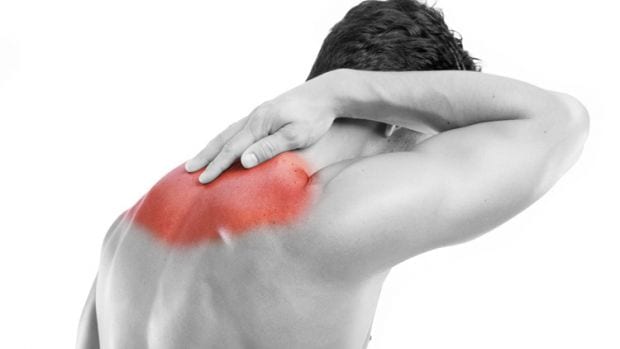Following a workout your muscles will feel a bit sore and stiff, then as time progresses the pain begins to intensify requiring actions to take place. There really is no way to prevent muscle soreness since it occurs from your muscles receiving microscopic tears within the tissue, which is a result of you using the muscles in order to perform a task whether it be walking up a stair case, or lifting weights at the gym. The cycle is continuous, but there are 5 steps to reduce muscle soreness that you can perform to reduce the time and pain. This process then leads to muscle hypertrophy (growth) if performed properly.
1) Consume Healthy Nutrients
Nutrients come from the foods that we consume throughout the day, and people often forget about how important it is to eat small portioned meals and snacks in order to reduce muscle soreness and encourage the growth of muscles, but most importantly just to maintain a healthy lifestyle to have plenty of energy to function during the day. The primary nutrients to focus on are known as macronutrients, which are protein, carbohydrates, and dietary fats.
Protein is often referred to as the building blocks of life since they are found in all processes taking place within your body such as bone growth, muscle repair, and digestion. This nutrient will keep your muscles well fed and allow muscle repair to take place at a rapid pace compared to an individual that frequently consumes insufficient amounts of protein. You can receive protein by consuming meats, poultry, dairy, and fish as well, but this is just a short list compared to the hundreds of foods that contain significant sources of protein.
2) Replenish your Water Intake
Water is very important for the process of reducing muscle soreness, and is something that has to be consumed on a daily basis. Water accounts for 55%-75% of your overall bodyweight, the specific percentage depending on your age, gender, and physical form. The bad part is research shows 55 out of 100 people are dehydrated and deficient in their water intake, which can easily cause your muscles to become more sore than usual.
Easy signs to spot dehydration are frequent headaches, chapped lips, and dizziness. However, and unusual symptom that causes people to gain weight is that dehydration can appear in the form of hunger. A lot of people actually gain weight because of this since they eat more when their body is actually telling them it wants water. Sip on water throughout the day especially during training, but do not chug it since cramping can occur.
3) Perform Stretches during the Day
Once muscle soreness sets in they begin to tighten up and become stiff. Stretching helps keep your muscles relaxed and prevent them from becoming locked out since they keep them loose. Unless you are suffering from a serious injury, it is recommended that you strength routinely to reduce muscle soreness. Stretching prior and during a workout is also recommended since it not only reduces later soreness, but also because stretching helps prevent injuries since the muscles are “warmed” up and ready to move your body however you desire.
4) Rest is Required
Rest ranges from the time you sleep at night, or even taking a break after training a specific muscle group. For example, if your targeted your leg muscles, then you may wish to take a break until at least 24 hours have passed to establish proper healing for your muscle tissue. However, sleeping is rather important since this is the time your body is hard at work digesting nutrients and transporting them to their respective areas. 6-8 hours of sleep at night should be enough time for your body to recover. Your body is always in constant motion within to ensure all organs are functioning properly, and the nutrients and water being consumed are being used to support all of this.
5) Cold Shower or Bath
Taking a cold shower or bath is not for everyone, but it has been a useful technique that athletes have used to reduce muscle soreness. The coldness will allow your blood vessels the opportunity to tighten up, thus allowing lactic acid to escape from your muscle tissues. Lactic acid is a type of waste that comes from the creation of energy from your body to maintain a constant motion during working out, which could be a motion such as lifting weights. This is the cause for muscle fatigue and extended muscle soreness.
10 minutes of cold water soaking should be enough time for your body to do what it does best, but if you feel uncomfortably numb or unsure then get out of the soak and warm up. Not everybody is capable to perform this since some have lower tolerances than others. Stretch about half an hour afterwards to help loosen up your muscles again.
Eat, Drink, and Sleep
The time of your muscle soreness is usually going to decrease significantly if you consume proper nutrients, drink plenty of water, and get enough rest for your body as a whole. Stretching is also the key factor to decreasing your muscle soreness, and as mentioned assists most people with prevention against sports injuries. Always consult a physician prior to making any changes to your diet if you have had any medical conditions that may cause serious injury to your body.
 Patrick Banks is a Berlin based writer with an intense passion for health & fitness. He provides tips on how to eat well, naturally boost your energy and feel confident with your body. You can check his health & fitness as well as relationship advice out on Wingman Magazine.
Patrick Banks is a Berlin based writer with an intense passion for health & fitness. He provides tips on how to eat well, naturally boost your energy and feel confident with your body. You can check his health & fitness as well as relationship advice out on Wingman Magazine.








